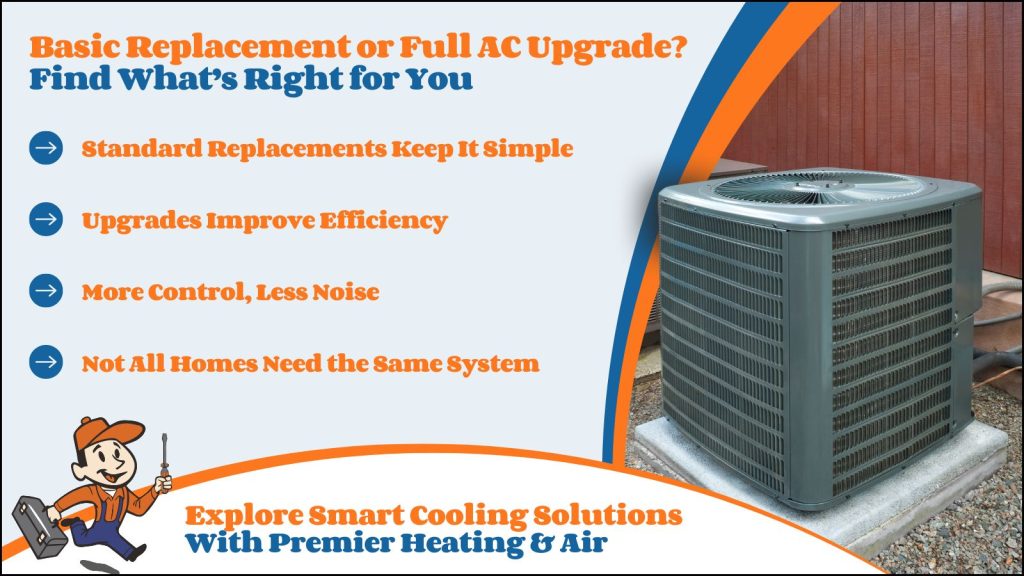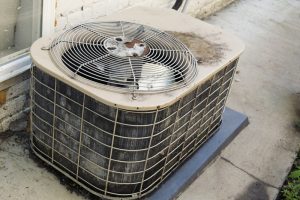When it’s time for an AC system replacement in Sandersville, GA, you’re likely faced with a big question: Should you stick with a similar model or explore something new? At Premier Heating & Air, we’ve helped countless homeowners across Middle Georgia make this important decision, and we understand how overwhelming it can feel.
How Should You Replace Your Heating and Air System: Similar Model or Something New?
- Stick with a similar model if you want lower upfront costs, easy installation, and dependable performance.
- Opt for an upgrade to gain energy efficiency, advanced features, and improved comfort, especially useful if your home layout or needs have changed.
- Consider the trade-offs: Basic models cost less now, but new systems may provide long-term savings, smarter control options, and zoning capabilities.
- Match your choice to your needs: If you’re planning to stay in your home long-term or want more control and savings, an upgraded system may offer the best value.
Choosing a replacement isn’t just about swapping out old equipment—it’s an opportunity to improve your home’s comfort, energy efficiency, and long-term value. We’ll walk you through the pros and cons of both approaches, plus share tips on when a full upgrade might be the smartest move.

When It’s Time to Replace Your AC
Before we explore your options, it’s important to recognize when your AC is due for replacement. Here are common signs it’s time to start shopping for a new unit:
- Your AC is over 10–15 years old
- Frequent breakdowns or expensive repairs
- Rising energy bills without improved performance
- Inconsistent cooling or poor airflow
- Your system still uses R-22 refrigerant (which is being phased out)
If you’re facing any of these issues, you’re already on the right track—especially if you’re wondering how old is too old for AC.
Option 1: Replacing With a Similar Model
Choosing a new version of your current air conditioner—same type, similar capacity, and basic features—is often the simplest route.
Pros
- Lower upfront cost: Standard replacement units tend to be less expensive than high-efficiency or feature-rich models.
- Familiar functionality: If you’ve been generally satisfied with your existing system, a similar model offers predictable performance.
- Easier installation: No major changes to your home’s ductwork, thermostat, or electrical components are typically needed.
Cons
- Missed opportunities for energy savings: Today’s advanced systems can offer substantial improvements in efficiency that older designs simply can’t match.
- Limited features: Sticking with the basics means you may miss out on conveniences like smart controls, zoning, or variable-speed technology.
- May not be ideal if your home’s needs have changed: If you’ve renovated, added square footage, or noticed uneven cooling, your current system size may no longer be the best fit.
Option 2: Upgrading to a New Type of System
If you’re ready to embrace innovation and improve your comfort, upgrading to a more advanced or different type of cooling system may be the better choice.
Pros
- Higher energy efficiency: New models, including variable-speed and inverter-driven systems, use less energy and deliver more consistent comfort.
- Advanced features: Enjoy benefits like humidity control, quieter operation, improved air quality, and Wi-Fi-connected smart thermostats.
- Customized comfort: Zoned systems or ductless mini-splits offer personalized climate control in different areas of the home.
Cons
Higher initial cost: Premium systems come with a larger investment upfront.
More complex installation: You may need updates to ductwork, electrical wiring, or other components to accommodate a new system type. Before making the leap, consider the pros and cons especially if you’re eyeing a high-efficiency AC system upgrade that could improve performance and comfort.
How to Decide: Factors to Consider
Every home—and every homeowner—is different. Here’s what we recommend thinking about when deciding between a similar model and a more advanced system:
- Your budget: While upgrades can pay off in the long run, they do cost more upfront. We can help you explore financing options and rebates that may be available.
- Your long-term plans: If you’re planning to stay in your home for many years, investing in a high-efficiency system makes more sense. For short-term needs, a standard model may be sufficient.
- Your current comfort level: Are you happy with how your old system cooled your home? Or were you constantly adjusting the thermostat or battling hot spots?
- Home layout and size changes: Renovations, additions, or aging ductwork may all point to the need for a different type of system. If you’re unsure, be cautious before thinking about a DIY air conditioning installation it often introduces more risk than reward.
Ready to replace your air conditioner? Contact Premier Heating & Air today for a free estimate and expert help choosing the system that’s perfect for your home and budget.


